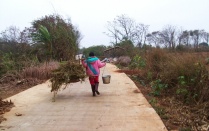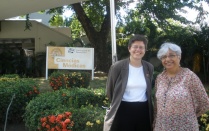campus news
Doctoral students gets firsthand experience with White House internship

UB doctoral student Michelle Goulette, a Health Policy Research Scholar with the Robert Wood Johnson Foundation, began studying drug-related health policy after seeing the toll of the opioid epidemic on the people she cared about. Her commitment and determination to tackle this complex issue recently took Goulette all the way to an internship in the White House.
By ALEXANDRA SACCONE
Graduate student, Department of Environment and Sustainability
Published October 2, 2024
Editor’s note: Any views expressed here do not reflect the official positions of the administration.
Growing up in rural New York, Michelle Goulette witnessed friends and family struggle with drug addiction.
“I knew I wanted to make a change in this area, I just wasn’t sure how I could,” says Goulette, a doctoral student in the Department of Community Health and Health Behavior, School of Public Health and Health Professions.
While working as a Health Policy Research Scholar with the Robert Wood Johnson Foundation, Goulette began studying drug-related health policy after seeing the toll of the opioid epidemic on the people she cared about. Her commitment and determination to tackle this complex issue recently took her to the White House, where she spent the summer as an intern in the Executive Office of the President’s Office of National Drug Control Policy (ONDCP) studying policies that impact communities at the national level.
“I gained valuable insight into the intersection of health policy, research and practice by studying and contributing to the development of national drug control policies, with a focus on their impact on vulnerable communities and populations affected by substance use,” Goulette explains.
The ONDCP leads interagency and intergovernmental policy development and analysis focused on two distinct but interconnected mission spheres: public health interventions aimed at reducing illicit substance use or misuse of prescription drugs, and interdiction initiatives aimed at reducing the trafficking and overall availability of illicit substances and their chemical precursors.
Goulette credits the Department of Community Health and Health Behavior with preparing her to be successful in this role: specifically, the rigorous academic training, openness to letting graduate students explore alternative career opportunities, and the ability to study alongside some of the best addiction researchers in the country. She says the department empowers its graduates to become leaders in addressing health disparities and promoting health equity — and making positive, impactful changes to the health of communities all over the world.
Goulette says the White House internship has helped steer the course of her doctoral research at UB by helping her refine her research skills working on a first-author publication focused on opioid resettlement lawsuits.
“This project furthered my writing skills and allowed me the ability to learn how research is used to inform policy at the federal level,” she says. At UB, her research has evolved into a focus on cannabis: cannabis use, regulatory science and administration.
After obtaining undergraduate degrees in public communications from SUNY Buffalo State University and anthropology from St. John Fisher University, she secured a job in the graduate education office for the schools of Arts & Sciences and Engineering & Applied Sciences at the University of Rochester, where she also obtained an MPH. It was while at Rochester that she discovered how research is used to influence policy decisions, which secured her decision to obtain a PhD to learn how to be a successful researcher involved with health policy.
Goulette plans to continue her research on the topic in an academic or governmental setting after receiving her doctorate.
We want to hear about what you are doing in the field of global health. UB faculty, staff, and students, please send us articles highlighting your work!










